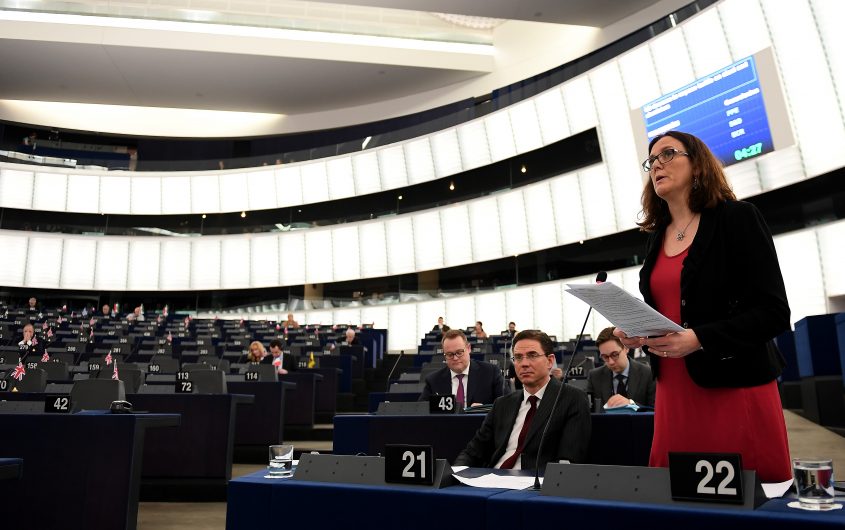
FREDERICK FLORIN/AFP/Getty Images
Restarting the Transatlantic Partnership Before It’s Too Late

Maria Skóra
Das Progressive Zentrum
Maria Skóra is an independent consultant and advisor affiliated with the Institut für Europäische Politik as a Research Fellow and a Policy Fellow at Das Progressive Zentrum. In 2019, she was a Visiting Fellow at the German Marshall Fund of the United States and AGI’s American-German Situation Room. Previously, she worked for the Humboldt-Viadrina Governance Platform and the Hertie School. She is based in Berlin and holds an MA in Sociology and a PhD in Economics.
Her interdisciplinary research focuses on (re)democratization, populism, and political sociology. From 2022 to 2024, she was a lead researcher at RESILIO, a project exploring the determinants of rule of law resilience in EU27. Her work also focused on how to improve the EU’s rule of law toolbox while facing the ongoing democratic backsliding in some member states. From 2018 to 2021, she co-designed and launched New Urban Progress, a U.S.-German exchange project bringing young professionals and experts from both sides of the Atlantic into a conversation about sustainable and equitable cities.
As a DAAD/AGI Research Fellow this fall, she will combine her expertise in democracy research with the German-American dialogue. Based on her research experience within the European context, she will apply a similar analytical framework to explore the resilience pillars of American democracy. The focus lies on different levels of the political system: political culture, institutions, actors, and citizens. The results will deliver ideas for mutual learning and designing policy responses. Both the United States and Germany face important elections in the near future. Therefore, finding meaningful synergies to make our societies and democracies more resilient against illiberal populism and political polarization is crucial.
We live in an era of rapid changes. It is not the first time that mankind has faced a fundamental socio-technical transformation, but it is the first time that it is happening so quickly. This transformation is also giving rise to new potential superpowers and opening new fronts of competition. When thinking about the transatlantic partnership, it is worthwhile to look at the mega-trends that shape our future today: digital progress, climate change, and globalization. If managed beyond self-interest, they can potentially boost a new opening between Europe and the United States.
Twenty-first Century Challenges
Technological progress has not only made it possible to produce more, faster, cheaper. It is also changing the world as we know it. On the one hand, we see more and more evidence of human impact on the natural environment—never before was it such an acute problem as today. On the other hand, new technologies speed up productivity growth, gradually making human labor obsolete. In the era of globalization, radical innovations can build and tear down bridges. Climate change and the fourth industrial revolution therefore set a common framework for global development in the coming decades.
In the era of globalization, radical innovations can build and tear down bridges.
When facing climate change, decarbonization of economies by turning toward renewables is one of the answers. For example, Germany, in a precursor to the European energy transition, will phase out coal-fired power plants by 2038. In the meantime, policies are being implemented to move away from nuclear and fossil fuels and toward renewables in an effort to foster energy efficiency and optimize energy consumption. As a result, since 1990 the emissions of greenhouse gases decreased in Germany by approximately 25 percent. In the U.S., total coal consumption in 2018 was at the lowest level since 1979, falling by 44 percent only within the last decade. This was possible mainly thanks to declining coal use in the electric power sector and by favoring natural gas and renewables for economic and environmental reasons. Even with these successes, both the European energy transition targets as well as the long-term objective to keep the global temperature rise below 2 degrees Celsius still need to be championed. At the same time, pursuing such ambitious goals will significantly impact the economies and the labor markets globally—not only by creating new jobs and industries, but also by causing job losses due to phasing out fossil fuel-fired sectors.
Similar flaws and opportunities can be attributed to the process generally described as the digital transformation: “a pervasive adoption of a wide variety of digital, real-time, and networked technologies, products, and services enabling people, companies, governments, and even machines to stay connected and communicate with one another, gathering, analyzing, and exchanging massive amounts of information on all kinds of activities.” In recent years, the U.S. has become highly digitized, assuming a forerunner position in certain aspects of the digital revolution. The U.S. ranks fifth in the Networked Readiness Index and is the dominant supplier of digital technologies to the world. U.S.-based firms account globally for nearly half of sales in the global information and communication technology (ICT) sector, a 74 percent share in the Internet of Things (IoT) companies, and a 60 percent share of big data companies. Europe (including Germany) lags behind: the European digital frontier represents only 60 percent of the American one. At the same time, the U.S. economy as a whole has reached only 18 percent of its digital potential—the future is still to come. Experts are undecided whether technology will displace more jobs than it creates, but it’s clear that ongoing technological progress will bring structural mismatches. The World Bank has already warned that digitalization might increase inequalities. Unfair competition and tightening links between technology, innovation, and national security are other sources of distress.
Turning Challenges into Chances
According to a recent survey by Pew Global, climate change, cybersecurity threats, and the vulnerable condition of the global economy raise the most concerns about the future both in the U.S. and in Europe. The growing influence of China and Russia provide fertile ground for these fears. At the same time, there is little hope that relations between the EU and the U.S. will soon improve—definitely not with regard to diplomatic issues. So has security really become the only space for transatlantic cooperation, more as a marriage of convenience than out of true commitment? What about boosting cooperation to tackle global challenges together?
First, it seems that with the right policies and technologies put in place, a greener economy can become a success story. But questioning scientific evidence on man-made climate change to justify a lack of collective, intergovernmental action poses a significant threat to accomplishing this ambitious project. Europe and the U.S. pulling in opposite directions seems to be the biggest obstacle on the way to the transition. Second, the ongoing digitalization of economies offers as many challenges as opportunities. Regardless of the angle, according to many, the EU-U.S. trade talks have to give e-commerce and digital trade rules top priority. However, these days even a general agreement is difficult to reach and the protests sparked by TTIP negotiations back in 2016 reflected the broad gap across the Atlantic (as Tony Judt put it): a contrast between the “American way of life” and the “European social welfare,” “the American pursuit of wealth, size, and abundance” clashing with “stagnant Europe” and its social model—“a mirage” in a globalized world.
So far, the question of which Dream—the American or the European—will stand the test of time remains unanswered. Meanwhile, both the technological revolution and climate change proceed unperturbed; without seeking synergies, the EU and the U.S. will miss the opportunity to catch on, yielding the way to other emerging leaders.
Restarting the Transatlantic Partnership Now
In the United States, the climate for innovation is fostered by the openness for research capitalization and interest in public-private partnerships. In Germany, as well as in other European countries, it’s the policies and incentives of central governments that play a pivotal role. But despite these differences, why not face challenges together? Both resources and ideas are there, it is political will and trust that’s lacking.
The transatlantic partnership can only be revived if the pursuit for growth advances by means of mutually beneficial cooperation, not deadly competition.
The transatlantic partnership can only be revived if the pursuit for growth advances by means of mutually beneficial cooperation, not deadly competition. Suspecting the other partner of bad intentions or downgrading diplomatic ties will neither help face the expansionist attempts of Vladimir Putin nor keep pace with Xi Jinping’s global ambitions. So when Track I diplomacy fails, the hope remains in informal interactions between societies. Intergovernmental dialogue, so often dependent on ad hoc political circumstances, must be flanked through intensifying soft power. Building innovations together can be incubated through city-to-city diplomacy, science diplomacy, or even direct start-up diplomacy.
Meanwhile, on March 7, 2019, EU trade commissioner Cecilia Malmström gave a lecture at Georgetown University urging the U.S. and Europe to launch “[t]he next transatlantic project—one that will guarantee stability and prosperity for the next generation. One that will establish our alliance and our values as a force to be reckoned with for another 70 years.” The timing for having such conversation is far from ideal. The term of the current European Commission soon comes to an end as the European Union faces parliamentary elections in May 2019. The U.S. presidential election is quickly approaching in 2020, with the outcomes difficult to predict. Therefore, stressing the gravity for renewing transatlantic cooperation for economic growth and investments in innovations before it is too late, this appeal could not be more appropriate. The “too big to fail” assumption is not enough strategy in times of the crumbling world order.








